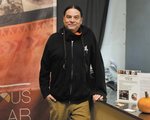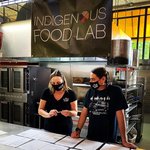

When Sean Sherman goes to work every day, he isn’t just cooking for cooking’s sake. The Oglala Lakota Sioux chef, cookbook author, and promoter of Indigenous cuisine is reclaiming and rebuilding the broken foodways of his ancestors, before they are lost forever.
Six years ago, Sherman started an Indigenous catering business called the Sioux Chef, which would eventually employ almost two dozen people. He traveled across the Twin Cities with his award-winning Tatanka Food Truck. On the menu were, among other things, Indigenous tacos made with cedar braised bison, smoked turkey with forest mushrooms, sumac seared walleye filet, and grilled squash with pumpkin seeds. According to Sherman, “Native American food is not only delicious and beautiful, it is literally medicine.”
Once you take away the Colonial ingredients introduced to North America by European explorers, what’s left is food that is beneficial for heart health, and helps prevent diabetes, obesity, inflammatory diseases like arthritis, and even tooth decay.
All this begs the question that Sherman began asking himself years ago, as a young chef starting out in the restaurant industry. “Why weren’t there Native American restaurants all over the place?”
It was clearly time to open one.
Growing a vision
In 2016, Sherman and his business partner/spouse Dana Thompson submitted a proposal to the Minneapolis Park and Recreation Board. Their enterprise, The Sioux Chef, was chosen from a stack of applicants to develop a restaurant at the new Waterworks Park site near St. Anthony Falls. Their restaurant, called Owamni by the Sioux Chef, is still on track to open this spring despite the challenges of the pandemic. Owamni means “swirling water.”
The process has not been quick, but it has been clarifying.
Thompson said, “To broaden our knowledge base of Indigenous foods, we traveled across the country and talked with members of many different Native American tribes. We cooked together, and ate together. Sean and I formed the greater vision of reclaiming Native American community health through nutrition.”
“From then on, we saw the restaurant concept as a starting point rather than an end goal.”
Sherman and Thompson spent the next two years developing a non-profit organization called Native American Traditional Indigenous Food Systems (NATIFS). Their mission is to promote Indigenous foodways, and to facilitate Indigenous food access.
Sherman said, “The path for us now is very clear. With Indigenous food ingredients, and training for Native American cooks to learn to prepare time-honored recipes, we can strengthen our culture -- and strengthen our identity. By sharing this knowledge, and this training model, with Native people across the country, we can collectively be the answer to our ancestor’s prayers.”
Indigenous Food Lab
at Midtown Global Market
At the heart of NATIFS’ mission, the Indigenous Food Lab was born.
Thompson explained, “Sean and I were two kids born into abject poverty, but we were determined to raise money to develop the Indigenous Food Lab. Suddenly we were talking to the Rockefellers, and other major philanthropic organizations. Between June 2019 and January 2020, we raised about 75% of the needed start-up funds. We eventually found a location at the Midtown Global Market that fit our model, and that we could afford. Minneapolis commercial leases are not for the faint of heart.”
The Indigenous Food Lab has been up and running since June of this year. It houses a professional Indigenous kitchen and training center covering all aspects of food service, including research and development, Indigenous food identification, gathering, cultivation, and preparation, and all components of starting and running a successful culinary business based on Native traditions and Indigenous foods.
Food free through December
Sherman said, “In response to food insecurity made worse by the pandemic, as well as George Floyd’s murder and its aftermath, we mobilized our team at the Indigenous Food Lab.
“The staff and volunteers there prepare 400+ free meals/day as part of a collaboration with Minnesota Central Kitchen, and that number will soon double. We currently have support to feed homeless encampments, elder centers, people accessing food shelves, and other at-risk groups through December. We hope to raise funds to continue these efforts. Building strong community is at the core of what we do.”
For more information on NATIFS, or to sign up for a volunteer shift in the kitchen, visit https://www.natifs.org.
Comments
No comments on this item Please log in to comment by clicking here